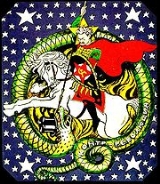
1918 First victory of Red Army over the Kaiser's German troops near Narva and Pskov. In honor of this victory, the date is celebrated from 1923 onward as "Red Army Day"; it is renamed Defender of the Fatherland Day after the fall of the Soviet Union in 1991, and is colloquially known as "Men's Day".
1920 Kiev Offensive: Polish troops led by Józef Piłsudski and Edward Rydz-Śmigły and assisted by a symbolic Ukrainian force capture Kiev only to be driven out by the Red Army counter-offensive a month later.
1920 Polish-Soviet War: the Battle of Warsaw begins and will last till August 25. The Red Army is defeated.
1920 Polish-Soviet War: Battle of Warsaw, which began on August 13, ends. The Red Army is defeated.
1921 The Red Army captures Mongolia from the White Army and establishes the Mongolian People's Republic.
1939 Joint victory parade of Wehrmacht and Red Army in Brest-Litovsk at the end of the Invasion of Poland.
1941 World War II: Field Marshal Georgy Zhukov takes command of Red Army operations to prevent the further advance into Russia of German forces and to prevent the Wehrmacht from capturing Moscow.
1942 World War II: Second Battle of Kharkov: in eastern Ukraine, Red Army forces under Marshal Semyon Timoshenko launch a major offensive from the Izium bridgehead, only to be encircled and destroyed by the troops of Army Group South two weeks later.
1943 World War II: The Battle of Stalingrad comes to conclusion as Soviet troops accept the surrender of 91,000 remnants of the Axis forces.
1943 World War II: Red Army troops re-enter Kharkov.
1944 World War II: Minsk is liberated from Nazi control by Soviet troops during Operation Bagration.
1944 World War II: the Red Army enters Tallinn.
1944 World War II: Riga, the capital of Latvia is liberated by the Red Army.
1944 World War II: The Soviet Red Army enters Hungary.
1945 Liberation of the Budapest ghetto by the Red Army.
1945 World War II: Soviet forces liberate the Łódź ghetto. Out more than 200,000 inhabitants in 1940, less than 900 had survived the Nazi occupation.
1945 World War II: The Red Army liberates the Auschwitz-Birkenau concentration camp in Poland.
1945 World War II: The siege of Budapest concludes with the unconditional surrender of German and Hungarian forces to the Red Army.
1945 World War II: Soviet Union forces invade Austria and take Vienna; Polish and Soviet forces liberate Gdańsk.
1945 The Red Army begins the final assault on German forces around Berlin.
1988 Soviet war in Afghanistan: After more than eight years of fighting, the Red Army begins its withdrawal from Afghanistan.
2007 Estonian authorities remove the Bronze Soldier, a Soviet Red Army war memorial in Tallinn, amid political controversy with Russia.

